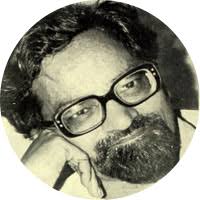 Amiq Hanafi
Amiq Hanafi
(ʻAmīq Ḥanafī)
1928-1985
 Amiq Hanafi
Amiq HanafiAmiq Hanafi (ʻAmīq Ḥanafī; 1928-85) was born Abdul Aziz Hanif (‘Abdul ‘Azīz Ḥanīf) in Indore in what is today Madhya Pradesh. He was educated in nearby Mhow, a cantonment in Indore District. He received two M. A.’s political science (1952) and history (1954). He started writing poetry during his student days in Mhow and published his first poetry collection, Sang-i pairāhan (Stone Dress; 1958), influenced by the then-pervasive Progressive view of literature. But he, like other Progressives, moved on to embrace modernist and post-colonial sensibilities in both his poetry and critical writings. His later collections are Sindbād: Tāwīl naẓm (Sinbad: Explanatory Poem; 1966), Shab-i gasht (Night Patrol; 1969), considered his best work, the lengthy Ṣalṣalat-ul jaras (Concatenation of the Bell; 1971), and Shajar-i ṣadā (Echo Tree; 1975). Various poems in Shab-i gasht seem to have an overriding theme of existential angst, even despair in a pre-dystopic world. The poems “Āʼīnah k̲h̲āne ke qaidī se” (To the Captives in the Mirror-House),* “Mashīnzādon̲ kī bastī men̲” (In the Land of the Machine-Born),* and “Taʻāruf” (Introduction)* address this crisis.
Besides being a prominent modern poet and a major broadcaster on All India Radio, he was also a keen literary critic with major interests in Indian philosophy and music. His Shiʻr cīz-i dīgar ast (Poetry Is Something Else; 1975) is study of eastern and western poetics, with special reference to Urdu versification, and Shuʻle kī shanāk̲h̲t (Understanding Poetry; 1986-87) is a collection of articles, chiefly on Urdu poetry. Ustād rajab ʻālī khān (Master Rajab Ali Khan; 1994) is a major biography of the distinguished Indian classical ḵẖayāl singer (1874-1959). See Anwer Azeem, “Urdu: Light at the End of Tunnel,” Indian Literature, 21:6 (1978) 107-21; Anisur Rahman, “Some Recent English Translations of Modern Urdu Poetry,” Journal of South Asian Literature, 24:2 (1989) 203-14, and “Five Poems,” tr. Riyaz Latif, Annual of Urdu Studies, 26 (2003) 217-22.
Poetry
1. Āʼīnah k̲h̲āne ke qaidī se / To the Captives in the Mirror-House
2. Jahāz kā panchī / The Ship’s Bird
3. Mashīnzādon̲ kī bastī men̲ / In the Land of the Machine-Born
Poetry
1. Āʼīnah k̲h̲āne ke qaidī se / To the Captives in the Mirror-House
2. Jahāz kā panchī / The Ship’s Bird
3. Mashīnzādon̲ kī bastī men̲ / In the Land of the Machine-Born
Shab gasht (Evening Patrol). Allāhābād: Shabk̲h̲ūn Kitāb G̲h̲ar, 1969.

